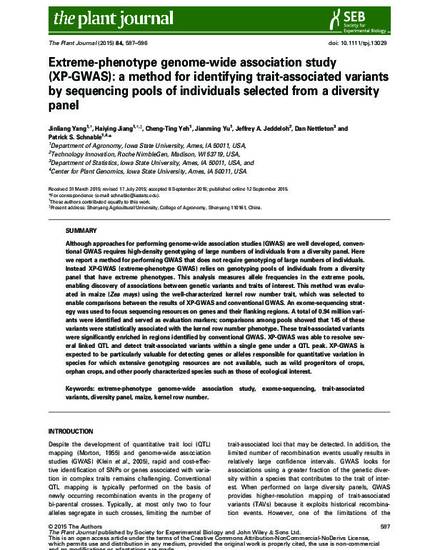
Although approaches for performing genome‐wide association studies (GWAS) are well developed, conventional GWAS requires high‐density genotyping of large numbers of individuals from a diversity panel. Here we report a method for performing GWAS that does not require genotyping of large numbers of individuals. Instead XP‐GWAS (extreme‐phenotype GWAS) relies on genotyping pools of individuals from a diversity panel that have extreme phenotypes. This analysis measures allele frequencies in the extreme pools, enabling discovery of associations between genetic variants and traits of interest. This method was evaluated in maize (Zea mays) using the well‐characterized kernel row number trait, which was selected to enable comparisons between the results of XP‐GWAS and conventional GWAS. An exome‐sequencing strategy was used to focus sequencing resources on genes and their flanking regions. A total of 0.94 million variants were identified and served as evaluation markers; comparisons among pools showed that 145 of these variants were statistically associated with the kernel row number phenotype. These trait‐associated variants were significantly enriched in regions identified by conventional GWAS. XP‐GWAS was able to resolve several linked QTL and detect trait‐associated variants within a single gene under a QTL peak. XP‐GWAS is expected to be particularly valuable for detecting genes or alleles responsible for quantitative variation in species for which extensive genotyping resources are not available, such as wild progenitors of crops, orphan crops, and other poorly characterized species such as those of ecological interest.
Available at: http://works.bepress.com/dan-nettleton/70/

This article is published as Yang, Jinliang, Haiying Jiang, Cheng‐Ting Yeh, Jianming Yu, Jeffrey A. Jeddeloh, Dan Nettleton, and Patrick S. Schnable. "Extreme‐phenotype genome‐wide association study (XP‐GWAS): a method for identifying trait‐associated variants by sequencing pools of individuals selected from a diversity panel." The Plant Journal 84, no. 3 (2015): 587-596. doi: 10.1111/tpj.13029.